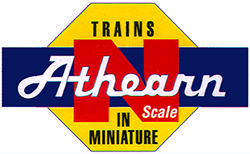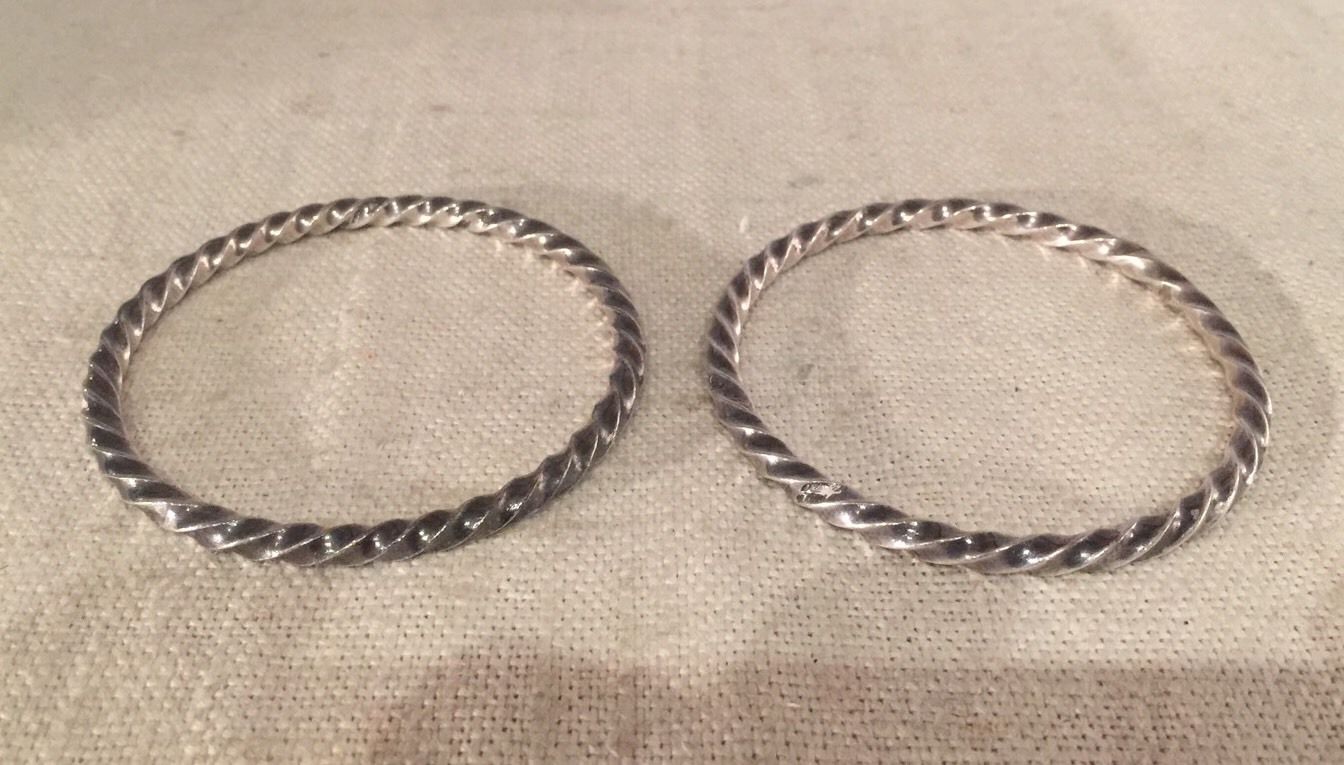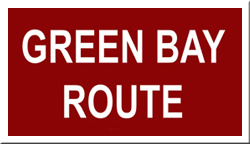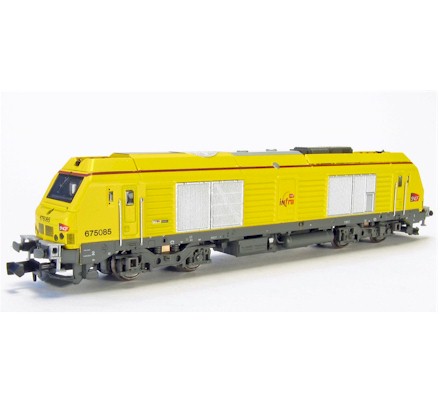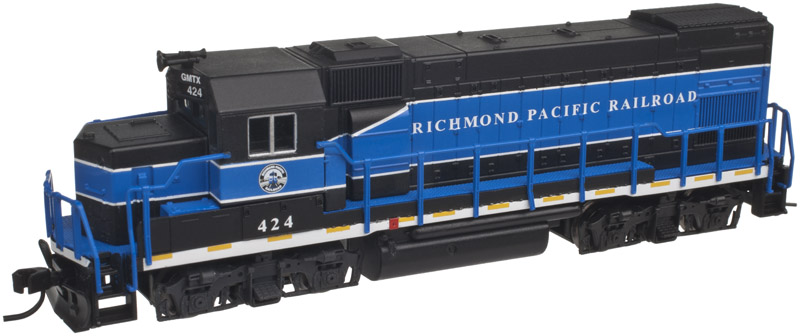Athearn - 2771 - Open Hopper, 3-Bay, Wood Chip - Gulf Mobile & Ohio - 82449
| Stock Number | 2771 |
| Original Retail Price | $29.98 |
| Brand | Athearn |
| Manufacturer | Athearn |
| Body Style | Athearn Open Hopper Wood Chip |
| Image Provider's Website | Link |
| Prototype | Open Hopper, 3-Bay, Wood Chip |
| Road or Company Name | Gulf Mobile & Ohio (Details) |
| Reporting Marks | GM&O |
| Road or Reporting Number | 82449 |
| Paint Color(s) | Black |
| Print Color(s) | White |
| Coupler Type | McHenry Magnetic Knuckle |
| Coupler Mount | Body-Mount |
| Wheel Type | Chemically Blackened Metal |
| Wheel Profile | Small Flange (Low Profile) |
| Announcement Date | 2020-06-01 |
| Release Date | 2021-10-01 |
| Item Category | Rolling Stock (Freight) |
| Model Type | Open Hopper |
| Model Subtype | 3-Bay |
| Model Variety | Wood Chip |
Road Name History:
 The GM&O was the product of the 1940 merger of Gulf Mobile & Northern and the Mobile & Ohio. During these early years, the GM&O consisted of a route from St. Louis south to Jackson, Tennessee where it then split into 2 routes to the port of Mobile, Alabama. In addition, there were routes to Memphis, Tennessee; Jackson, Mississippi; and Birmingham and Montgomery, Alabama. GM&O also served New Orleans and Paducah via trackage rights. The merger was championed by Ike Tigrett from the GM&N and Ike would lead the GM&O for most of its history.
The GM&O was the product of the 1940 merger of Gulf Mobile & Northern and the Mobile & Ohio. During these early years, the GM&O consisted of a route from St. Louis south to Jackson, Tennessee where it then split into 2 routes to the port of Mobile, Alabama. In addition, there were routes to Memphis, Tennessee; Jackson, Mississippi; and Birmingham and Montgomery, Alabama. GM&O also served New Orleans and Paducah via trackage rights. The merger was championed by Ike Tigrett from the GM&N and Ike would lead the GM&O for most of its history.
In 1947, GM&O acquired the Alton Railroad. This linked Chicago and Peoria with St. Louis and Kansas City. This acquisition made GM&O a Great Lakes to the Gulf carrier and pushed the mileage up over 2,700. GM&O tried to sell the Kansas City line in the 50’s to Santa Fe and Burlington but there was tremendous pressure from other lines to keep Santa Fe out of St. Louis. In the end, GM&O kept the route and Burlington got trackage rights on a portion of it to shorten its own route.
GM&O dieselized early with the last steam locomotive retired in 1949. The first generation freight diesel fleet included Alco switchers, road switchers (all of which were long-hood-forward,) and FA series cab units and EMD F units. For passenger service, GM&O had power from both Alco and EMD. Everything was painted red and maroon with gold lettering. Both Alton and GM&N had used red in the past so this was appropriate. The oddball of the fleet was #1900, a cab unit model 4-S built by Ingalls Shipbuilding. It was the only locomotive Ingalls would ever build.
The 60’s brought fleets of GP30’s and 35’s. These were delivered on Alco trucks from traded in FA’s and wore a new black and white paint scheme designed by EMD. A few years later, more new power arrived from EMD, this time GP38’s and SD40’s wearing two variations of red and white. First generation diesels still on the roster received solid red or maroon in some cases. The diesel fleet consisted of around 260 units.
As for passenger service, The Rebels ran south of St. Louis with a train each to New Orleans and Mobile. Seven trains a day connected St. Louis and Chicago – more than all other railroads combined between those cities. These included the Abraham Lincoln, Ann Rutledge, and Alton Limited. They also had a single daily Chicago commuter train called The Plug. Amtrak took over three of the Chicago – St. Louis departures in 1971.
By contemporary accounts, GM&O was a class operation with a thin layer of responsive management, esprit de corps in the ranks, and good track - all of this despite serving one of the poorest regions of the country. As the 1960s drew to a close, GM&O faced the impending retirement of the original management team. Because the management layer was so thin, there were few young up-and-comers being groomed to take their places. So, to protect the shareholders, GM&O began shopping for merger partners. In 1972, Gulf Mobile & Ohio merged with Illinois Central to form Illinois Central Gulf.

In 1947, GM&O acquired the Alton Railroad. This linked Chicago and Peoria with St. Louis and Kansas City. This acquisition made GM&O a Great Lakes to the Gulf carrier and pushed the mileage up over 2,700. GM&O tried to sell the Kansas City line in the 50’s to Santa Fe and Burlington but there was tremendous pressure from other lines to keep Santa Fe out of St. Louis. In the end, GM&O kept the route and Burlington got trackage rights on a portion of it to shorten its own route.
GM&O dieselized early with the last steam locomotive retired in 1949. The first generation freight diesel fleet included Alco switchers, road switchers (all of which were long-hood-forward,) and FA series cab units and EMD F units. For passenger service, GM&O had power from both Alco and EMD. Everything was painted red and maroon with gold lettering. Both Alton and GM&N had used red in the past so this was appropriate. The oddball of the fleet was #1900, a cab unit model 4-S built by Ingalls Shipbuilding. It was the only locomotive Ingalls would ever build.
The 60’s brought fleets of GP30’s and 35’s. These were delivered on Alco trucks from traded in FA’s and wore a new black and white paint scheme designed by EMD. A few years later, more new power arrived from EMD, this time GP38’s and SD40’s wearing two variations of red and white. First generation diesels still on the roster received solid red or maroon in some cases. The diesel fleet consisted of around 260 units.
As for passenger service, The Rebels ran south of St. Louis with a train each to New Orleans and Mobile. Seven trains a day connected St. Louis and Chicago – more than all other railroads combined between those cities. These included the Abraham Lincoln, Ann Rutledge, and Alton Limited. They also had a single daily Chicago commuter train called The Plug. Amtrak took over three of the Chicago – St. Louis departures in 1971.
By contemporary accounts, GM&O was a class operation with a thin layer of responsive management, esprit de corps in the ranks, and good track - all of this despite serving one of the poorest regions of the country. As the 1960s drew to a close, GM&O faced the impending retirement of the original management team. Because the management layer was so thin, there were few young up-and-comers being groomed to take their places. So, to protect the shareholders, GM&O began shopping for merger partners. In 1972, Gulf Mobile & Ohio merged with Illinois Central to form Illinois Central Gulf.
Brand/Importer Information:
Athearn's history began in 1938, when its founder-to-be, Irvin Athearn, started an elaborate O scale layout in his mother's house. After placing an ad selling the layout, and receiving much response to it, Irv decided that selling model railroads would be a good living. He sold train products out of his mother's house through most of the 1940s. After becoming a full-time retailer in 1946, Irv opened a separate facility in Hawthorne, California in 1948, and that same year he branched into HO scale models for the first time.
Athearn acquired the Globe Models product line and improved upon it, introducing a comprehensive array of locomotive, passenger and freight car models. Improvements included all-wheel drive and electrical contact. One innovation was the "Hi-Fi" drive mechanism, employing small rubber bands to transfer motion from the motor spindle to the axles. Another was the double-ended ring magnet motor, which permitted easy connection to all-wheel-drive assemblies. Athearn was also able to incorporate flywheels into double-ended drives.
The company produced a model of the Boston & Maine P4 class Pacific steam locomotive which incorporated a cast zinc alloy base and thermoplastic resin superstructure. It had a worm drive and all power pickup was through the bipolar trucks that carried the tender. This item was discontinued after the Wilson motor was no longer available, and was not redesigned for a more technologically advanced motor.
Athearn's car fleet included shorter-than-scale interpretations of passenger cars of Southern Pacific and Atchison, Topeka & Santa Fe Railroad prototypes. The company also offered a variety of scale-length freight cars with sprung and equalized trucks. The cars could be obtained in simple kit form, or ready-to-run in windowed display boxes. The comprehensive scope of the product line contributed to the popularity of HO as a model railroad scale, due to the ready availability of items and their low cost.
Irv Athearn died in 1991. New owners took control in 1994, but continued to follow Athearn's commitment to high-quality products at reasonable prices. Athearn was bought in 2004 by Horizon Hobby. Athearn was then moved from its facility in Compton to a new facility in Carson, California. In mid-2009, all remaining US production was moved to China and warehousing moved to parent Horizon Hobby. Sales and product development was relocated to a smaller facility in Long Beach, California.
Read more on Wikipedia and Athearn website.
Athearn acquired the Globe Models product line and improved upon it, introducing a comprehensive array of locomotive, passenger and freight car models. Improvements included all-wheel drive and electrical contact. One innovation was the "Hi-Fi" drive mechanism, employing small rubber bands to transfer motion from the motor spindle to the axles. Another was the double-ended ring magnet motor, which permitted easy connection to all-wheel-drive assemblies. Athearn was also able to incorporate flywheels into double-ended drives.
The company produced a model of the Boston & Maine P4 class Pacific steam locomotive which incorporated a cast zinc alloy base and thermoplastic resin superstructure. It had a worm drive and all power pickup was through the bipolar trucks that carried the tender. This item was discontinued after the Wilson motor was no longer available, and was not redesigned for a more technologically advanced motor.
Athearn's car fleet included shorter-than-scale interpretations of passenger cars of Southern Pacific and Atchison, Topeka & Santa Fe Railroad prototypes. The company also offered a variety of scale-length freight cars with sprung and equalized trucks. The cars could be obtained in simple kit form, or ready-to-run in windowed display boxes. The comprehensive scope of the product line contributed to the popularity of HO as a model railroad scale, due to the ready availability of items and their low cost.
Irv Athearn died in 1991. New owners took control in 1994, but continued to follow Athearn's commitment to high-quality products at reasonable prices. Athearn was bought in 2004 by Horizon Hobby. Athearn was then moved from its facility in Compton to a new facility in Carson, California. In mid-2009, all remaining US production was moved to China and warehousing moved to parent Horizon Hobby. Sales and product development was relocated to a smaller facility in Long Beach, California.
Read more on Wikipedia and Athearn website.
Item created by: CNW400
on 2020-10-09 11:34:44
Last edited by: CNW400 on 2020-10-09 11:34:45
If you see errors or missing data in this entry, please feel free to log in and edit it. Anyone with a Gmail account can log in instantly.
Last edited by: CNW400 on 2020-10-09 11:34:45
If you see errors or missing data in this entry, please feel free to log in and edit it. Anyone with a Gmail account can log in instantly.



